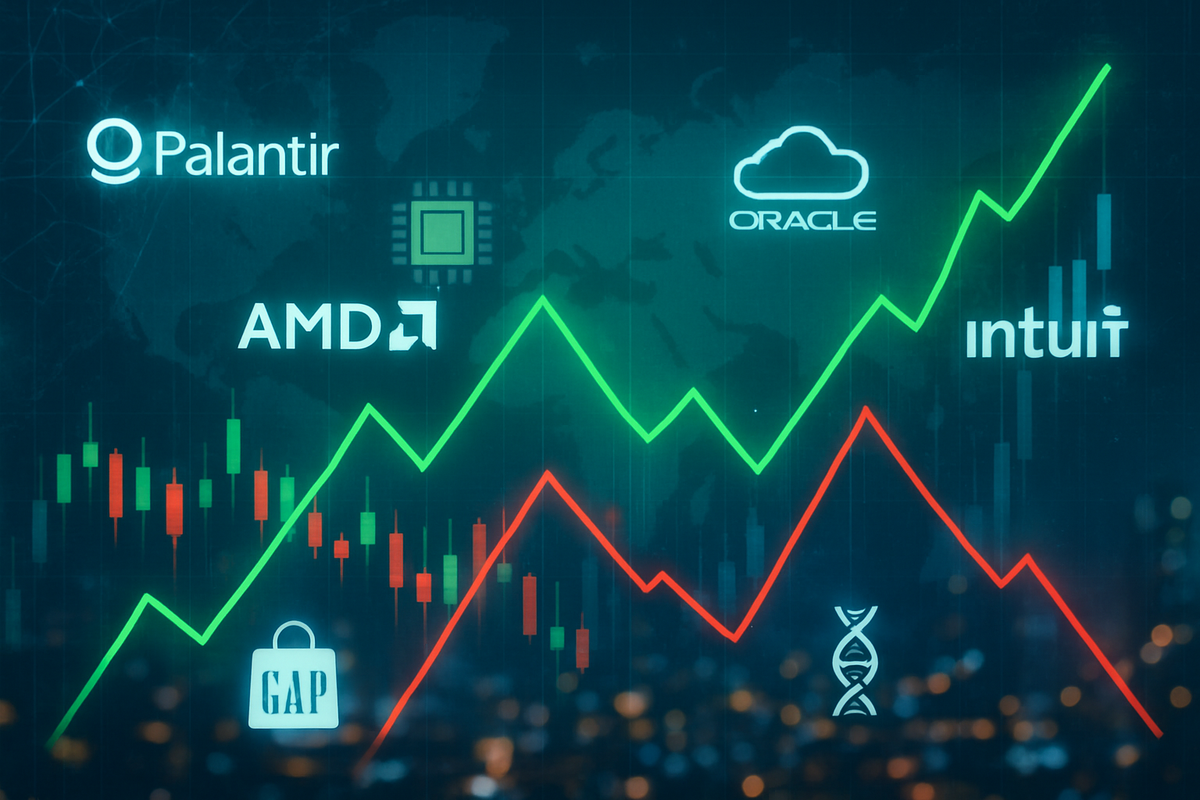Market Movers in Focus: Palantir, AMD, Oracle, Intuit, Gap, and Veeva Navigate a Dynamic November

As November 2025 draws to a close, the financial markets are buzzing with activity, driven by a confluence of earnings reports, strategic partnerships, and shifting investor sentiment. Against a backdrop of evolving technological landscapes and consumer spending patterns, several prominent companies have emerged as significant stock movers, capturing the attention of investors and analysts alike. From the cutting edge of artificial intelligence and cloud computing to the dynamic world of retail, the individual performances of these companies offer a compelling snapshot of the market's current trajectory and hint at future trends.
This month has highlighted the ongoing narrative of innovation and adaptation, with companies like Palantir, AMD, Intuit, and Veeva demonstrating the profound impact of AI and cloud solutions on their growth trajectories. Meanwhile, retail giant Gap navigates a challenging consumer environment with strategic turnarounds, and Oracle continues to assert its presence in the enterprise software space. The movements of these stocks on November 21, 2025, reflect not just their quarterly results but also the broader market's interpretation of their long-term potential and resilience in a rapidly changing global economy.
Unpacking the Performance: Key Events Driving Individual Stock Trajectories
November 2025 has proven to be a pivotal month for several market players, with significant events shaping their stock performance. Palantir Technologies (NYSE: PLTR) has experienced a notable pullback, dropping approximately 15% this month despite a strong Q3 2025 earnings report on November 3, 2025. The data analytics giant reported an EPS of $0.21 on revenue of $1.18 billion, significantly beating analyst estimates, with its U.S. commercial business surging by 121%. However, a subsequent stock sale by CEO Alex Karp on November 20, 2025, valued at $96 million, coupled with profit-taking and concerns over its premium valuation (375 times forward earnings), contributed to its decline. Despite this, the stock remains up over 131% year-to-date, buoyed by its critical role in AI infrastructure, as highlighted by Nvidia CEO Jensen Huang.
Advanced Micro Devices (NASDAQ: AMD) has continued its impressive run, with its stock up 86% this year. The semiconductor powerhouse reported robust Q3 2025 results on November 4, 2025, with record revenue of $9.2 billion, a 36% year-over-year increase, and an EPS of $1.20, surpassing consensus. The Data Center segment, driven by demand for its 5th Gen AMD EPYC™ processors and AMD Instinct MI350 Series GPUs, saw a 22% increase in revenue. AMD's strong position in high-performance computing and AI markets, coupled with optimistic Q4 2025 guidance, underscores its status as a leading growth stock.
Oracle (NYSE: ORCL), a stalwart in enterprise software and cloud services, did not have specific major news or earnings reports highlighted for November 2025 in recent market intelligence. However, its market movements are generally driven by its consistent growth in Oracle Cloud Infrastructure (OCI), strategic acquisitions, and ongoing demand for its database and enterprise applications. Its competitive standing against other cloud giants like Amazon Web Services (NASDAQ: AMZN) and Microsoft Azure (NASDAQ: MSFT) remains a key determinant of its performance, with significant contract wins often acting as catalysts.
Intuit (NASDAQ: INTU) saw its stock gain 3% in after-hours trading on November 21, 2025, following strong Q1 fiscal 2026 results. The financial software giant reported total revenue growth of 18% to $3.9 billion and an EPS of $3.34, both exceeding analyst expectations. Its Online Ecosystem revenue surged 21%, and consumer revenue grew 21%, driven by Credit Karma and TurboTax. A major catalyst was the announcement on November 18, 2025, of a multi-year strategic partnership with OpenAI, aiming to integrate Intuit's financial products directly into ChatGPT, significantly expanding its reach and reinforcing its AI-driven expert platform strategy.
In the retail sector, Gap Inc. (NYSE: GPS) shares jumped ahead of the opening bell on November 21, 2025, after reporting better-than-expected Q3 fiscal 2025 results. The company posted net sales of $3.9 billion, up 3% year-over-year, and diluted EPS of $0.62, both surpassing forecasts. Notably, comparable sales increased 5%, marking the seventh consecutive quarter of growth and the best in over four years, with Old Navy, Gap, and Banana Republic all contributing positively. Strategic partnerships, such as Old Navy's collaboration with DoorDash (NASDAQ: DASH) for on-demand delivery and Gap Inc.'s use of Google Cloud's (NASDAQ: GOOGL) AI, underscore its efforts to modernize and adapt to evolving retail landscapes.
Finally, Veeva Systems (NYSE: VEEV), a leading cloud solutions provider for the life sciences industry, saw its shares dip after releasing strong Q3 fiscal 2026 earnings on November 20, 2025. Despite total revenues of $811.2 million (up 16% year-over-year) and an EPS of $2.04, both exceeding analyst estimates, the stock experienced a slight post-earnings decline before recovering some ground. CEO Peter Gassner highlighted the rapid advancement of "Veeva AI" as a key driver for industry-specific AI agents, aiming to transform productivity in life sciences. The company also raised its Q4 and full fiscal year guidance, indicating continued confidence in its growth trajectory and its dominant position in a specialized, high-growth market.
Winners and Losers: The Shifting Sands of Market Fortunes
The current market dynamics, particularly highlighted by the performances of these stock movers, paint a clear picture of sectors and companies poised to win or lose. The undeniable winner is the Artificial Intelligence sector, with companies deeply entrenched in AI development and application seeing significant gains and investor interest. Palantir (NYSE: PLTR), despite its recent volatility, remains a key beneficiary due to its sophisticated AI-powered data platforms crucial for both government and commercial entities. AMD (NASDAQ: AMD) is another clear winner, with its high-performance GPUs and processors being the foundational hardware for AI innovation, driving strong demand from data centers and enterprise clients. Intuit's (NASDAQ: INTU) aggressive integration of AI through its OpenAI partnership positions it to revolutionize financial management for millions, potentially taking market share from less technologically advanced competitors. Veeva Systems (NYSE: VEEV) is leveraging "Veeva AI" to solidify its dominance in the life sciences cloud, enhancing productivity and customer centricity, thereby fortifying its competitive moat against generic cloud providers.
Conversely, companies that are slow to adapt to these technological shifts, particularly in AI and cloud adoption, stand to lose. Traditional software providers that lack robust AI integration or legacy hardware manufacturers struggling to compete with AMD's innovation could see their market relevance diminish. In the retail space, while Gap (NYSE: GPS) is showing signs of a turnaround through digital partnerships and AI integration, the broader retail landscape remains challenging. Retailers failing to modernize their supply chains, enhance their e-commerce capabilities, or provide compelling customer experiences will continue to struggle against agile, tech-forward competitors. The market's reaction to Veeva's strong earnings but slight stock dip also indicates that even high-growth companies in specialized niches are not immune to investor scrutiny regarding future growth potential and valuation, suggesting that even perceived winners must continuously justify their premium.
Wider Significance: Industry Trends and Ripple Effects
The performances of these stock movers in November 2025 are not isolated incidents but rather significant indicators of broader industry trends and their potential ripple effects. The most prominent trend is the accelerated integration of Artificial Intelligence across all sectors. Palantir's enterprise-grade AI platforms, AMD's AI-specific hardware, Intuit's AI-driven financial tools, and Veeva's specialized AI for life sciences all underscore that AI is no longer a futuristic concept but a present-day imperative for competitive advantage. This trend will inevitably lead to increased R&D spending, a talent war for AI specialists, and potentially new regulatory frameworks to govern AI ethics and data privacy. Competitors across these sectors will be compelled to invest heavily in AI capabilities or risk obsolescence, creating a significant ripple effect on technology budgets and strategic partnerships.
Another key trend is the continued dominance and evolution of cloud computing. Oracle's sustained efforts in OCI, alongside Veeva's specialized cloud solutions, demonstrate the critical role of scalable, secure, and industry-specific cloud infrastructure. This signifies a move beyond generic cloud services towards highly tailored, vertical-specific cloud offerings that address unique industry needs, potentially creating new market segments and intensifying competition among cloud providers. The retail sector, as exemplified by Gap's (NYSE: GPS) partnerships with DoorDash (NASDAQ: DASH) and Google Cloud (NASDAQ: GOOGL), is undergoing a rapid digital transformation, driven by consumer demand for seamless online-to-offline experiences and efficient supply chains. This trend will likely see further consolidation in the retail space, with digitally native brands gaining ground and traditional retailers either adapting swiftly or facing severe challenges. Historically, periods of rapid technological advancement, such as the internet boom or the rise of mobile computing, have led to similar shake-ups, with early adopters and innovators reaping substantial rewards while laggards struggle to catch up.
What Comes Next: Navigating Future Opportunities and Challenges
Looking ahead, the trajectories of these stock movers and the broader market will be shaped by several short-term and long-term possibilities. In the immediate future, the market will closely watch how Palantir (NYSE: PLTR) manages investor sentiment regarding its valuation and CEO stock sales, even as its underlying AI business continues to grow. AMD (NASDAQ: AMD) will face the challenge of sustaining its rapid growth in the highly competitive AI chip market, with continued innovation and market share gains against rivals like Nvidia (NASDAQ: NVDA) being crucial. Intuit's (NASDAQ: INTU) OpenAI partnership will be scrutinized for its execution and how effectively it translates into user adoption and revenue growth, setting a precedent for AI collaborations in financial technology. For Gap (NYSE: GPS), the upcoming holiday shopping season will be a critical test of its turnaround strategy and digital investments, providing insights into the resilience of consumer spending. Veeva (NYSE: VEEV) will need to demonstrate continued leadership in its specialized AI offerings for life sciences, converting early adopter success into widespread industry adoption.
In the long term, these companies represent bellwethers for their respective industries. The pervasive influence of AI will necessitate continuous strategic pivots, with companies needing to adapt their product roadmaps and business models to leverage emerging AI capabilities. Market opportunities will arise for companies providing AI-powered solutions, specialized cloud services, and enhanced digital retail experiences. However, challenges such as regulatory scrutiny over AI's ethical implications, intense competition, and potential economic downturns could pose significant headwinds. Investors should consider scenarios where AI adoption accelerates beyond current expectations, leading to further market re-ratings, or where economic pressures dampen consumer and enterprise spending, impacting growth rates. The ability of these companies to innovate, execute on their strategic visions, and navigate external pressures will determine their sustained success and market leadership.
Comprehensive Wrap-up: Investor Outlook and Lasting Impact
In summary, November 2025 has been a month of significant stock movements, largely driven by the accelerating impact of artificial intelligence and cloud computing across diverse sectors. Palantir (NYSE: PLTR), AMD (NASDAQ: AMD), Intuit (NASDAQ: INTU), and Veeva (NYSE: VEEV) exemplify the growth potential inherent in leveraging advanced technologies, even as market reactions to valuation and insider activity introduce volatility. Gap (NYSE: GPS) demonstrates that strategic adaptation and digital transformation can drive a turnaround even in challenging retail environments. Oracle (NYSE: ORCL) continues to be a foundational player in enterprise technology, with its cloud initiatives being a long-term driver.
Moving forward, the market will remain highly dynamic, with technology and innovation serving as primary catalysts for growth. Investors should pay close attention to companies' abilities to integrate AI effectively, expand their cloud footprints, and adapt to evolving consumer and enterprise demands. The lasting impact of these events will likely be a further entrenchment of AI as a core competitive differentiator and a continued shift towards specialized, data-driven solutions across industries. As we head into the coming months, investors should watch for further earnings reports, strategic partnerships, regulatory developments in AI, and macroeconomic indicators that could influence consumer and enterprise spending. The narrative of technological advancement versus market sentiment will continue to define the landscape, offering both opportunities and risks for the discerning investor.
This content is intended for informational purposes only and is not financial advice
More News
View More




Recent Quotes
View More
Quotes delayed at least 20 minutes.
By accessing this page, you agree to the Privacy Policy and Terms Of Service.